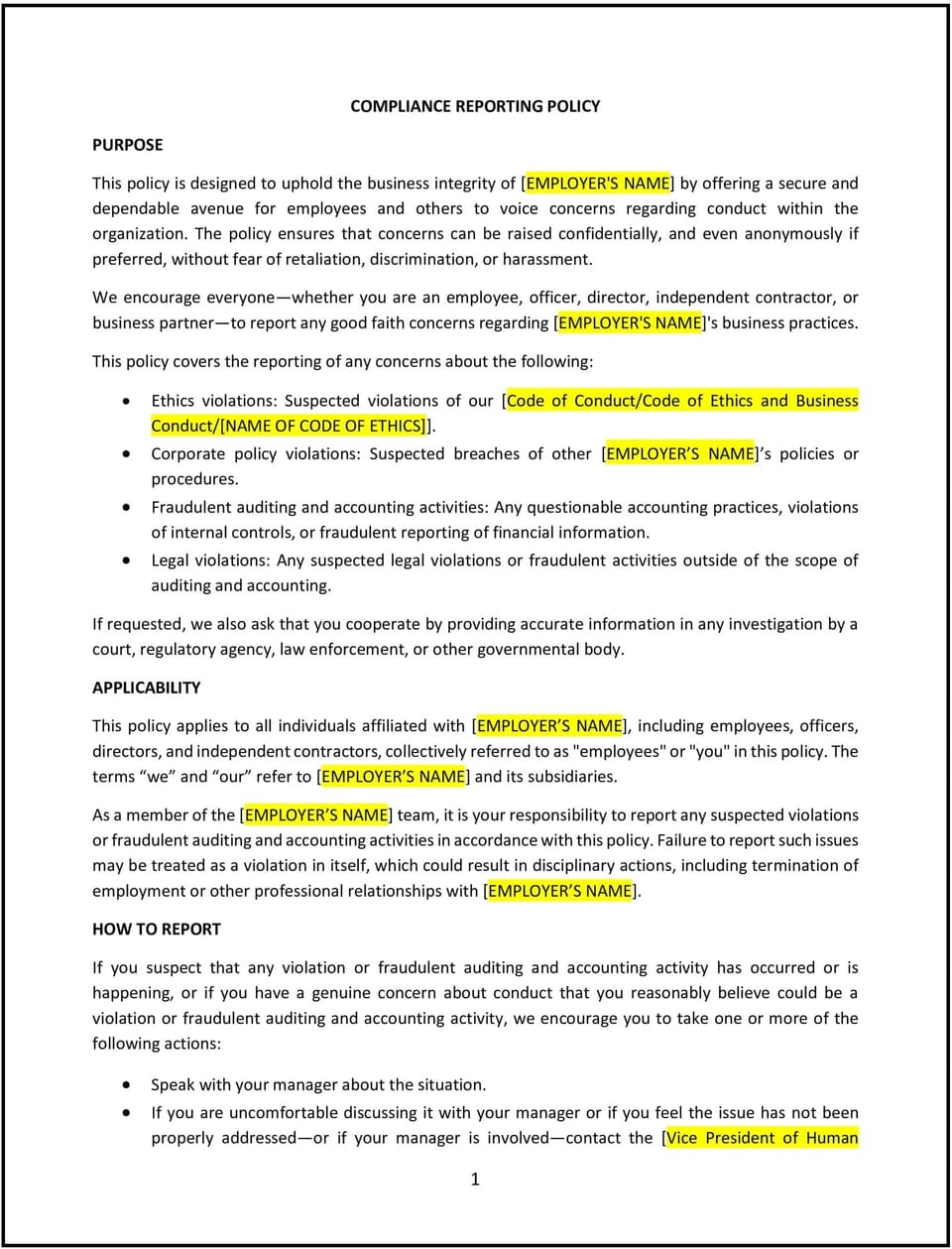Compliance reporting policy (Alabama): Free template

Compliance reporting policy (Alabama)
A compliance reporting policy provides employees and stakeholders with a secure and structured way to report concerns about misconduct, unethical behavior, or policy violations within the organization. For SMBs in Alabama, this policy helps ensure transparency, accountability, and adherence to legal and ethical standards. Tailoring this policy safeguards your business, protects whistleblowers, and promotes a culture of integrity.
How to use this compliance reporting policy (Alabama)
- Define the scope: Clearly outline the types of concerns that can be reported, such as fraud, harassment, or safety violations.
- Establish reporting channels: Provide multiple secure options for reporting, such as a dedicated hotline, email, or anonymous online form.
- Align with Alabama laws: Ensure the policy complies with state-specific regulations, including protections for whistleblowers.
- Communicate confidentiality: Reassure reporters that their identities will be protected to the fullest extent possible.
- Provide training: Educate employees on the importance of compliance reporting and how to use the provided channels responsibly.
Benefits of using a compliance reporting policy (Alabama)
A compliance reporting policy promotes accountability and protects your organization. Here's how it helps:
- Encourages transparency: Provides a structured process for addressing concerns, fostering trust within the organization.
- Ensures compliance: Helps your business adhere to Alabama laws and federal regulations regarding workplace conduct and reporting.
- Protects whistleblowers: Safeguards employees who report concerns from retaliation, promoting a safe reporting environment.
- Mitigates risks: Addresses potential issues before they escalate into legal or reputational crises.
- Builds a culture of integrity: Demonstrates your commitment to ethical and legal business practices.
Tips for implementing a compliance reporting policy (Alabama)
- Include multiple channels: Offer diverse reporting options to accommodate employees’ preferences, such as phone, email, or in-person discussions.
- Address industry-specific concerns: Tailor the policy to reflect risks common to Alabama industries, such as healthcare compliance or manufacturing safety.
- Clarify protection measures: Clearly outline how whistleblowers are safeguarded from retaliation and how reports are handled confidentially.
- Set response timelines: Commit to investigating and addressing reports promptly to maintain credibility and trust.
- Review regularly: Update the policy annually or as needed to reflect changes in Alabama laws or organizational priorities.
Q: What is a compliance reporting policy?
A: It is a policy that provides employees and stakeholders with a secure process for reporting concerns about misconduct or unethical behavior within the organization.
Q: Are compliance reporting policies required in Alabama?
A: While not explicitly required by Alabama law, implementing one helps your business comply with federal whistleblower protection laws and promotes ethical conduct.
Q: Can reports be made anonymously?
A: Yes, many policies include options for anonymous reporting to ensure individuals feel safe sharing concerns.
Q: How should reports be handled?
A: Reports should be investigated promptly and confidentially, with appropriate actions taken to resolve the issue.
Q: What protections are in place for whistleblowers?
A: Whistleblowers are protected from retaliation under federal law and this policy should emphasize your commitment to upholding those protections.
This article contains general legal information and does not contain legal advice. Cobrief is not a law firm or a substitute for an attorney or law firm. The law is complex and changes often. For legal advice, please ask a lawyer.


